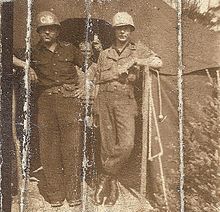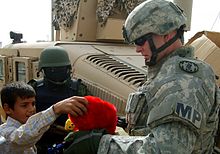- Military Police Corps (United States)
-
United States Army Military Police Corps 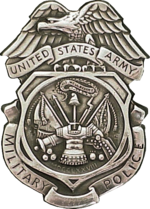
Military Police badgeActive 26 September 1941 – Country United States of America Part of Department of Defense
Department of the ArmyMotto " Of The Troops And For The Troops!" Branch Colors Green piped with yellow.
Green – 65007 cloth; 67129 yarn; PMS 357.
Yellow – 65002 cloth; 67108 yarn; PMS 123Engagements Revolutionary War
Northwest Indian War
Tecumseh's War
Creek War
Peoria War
War of 1812
Seminole Wars
Black Hawk War
Mexican-American War
Utah War
American Civil War
Spanish-American War
Philippine-American War
Banana Wars
Boxer Rebellion
World War I
World War II
Korean War
Vietnam War
Persian Gulf War
Kosovo War
Operation Enduring Freedom
Operation Iraqi FreedomCommanders Commandant Brigadier General David Philips Insignia Coat Of Arms 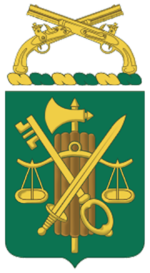
Branch Insignia 
Branch Plaque 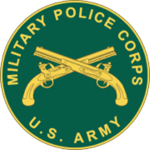
Regimental Insignia 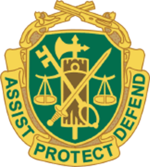
- For other uses, see Military Police Corps.
The Military Police Corps is the uniformed law enforcement branch of the United States Army. Investigations are conducted by Military Police Investigators or the United States Army Criminal Investigation Command (USACIDC), both of which report to the Provost Marshal General.
MPs are service members of the U.S. Army.
Some U.S. MP units, usually at the division or brigade level, are designated as combat, division MPs whose combat zone responsibilities include protection of vehicle routes, defile control, route reconnaissance and straggler control, the guidance or detention of soldiers who have become lost, separated from their units, or have fled the battlefield. Since the beginning of the war on terror, military police have become a valuable asset to combat operations due to the versatility of the MOS. They have been used more in a combat arms role rather than their normal combat support role.
Contents
Mission
The Army's Military Police provide an important function in the full spectrum of Army operations as a member of the Maneuver, Fires, and Effects division. The Military Police Corps provides expertise in police, detainment and stability operations in order to enhance security and enable mobility. The Army's Military Police can be utilized in direct combat and during peacetime. The Military Police have five main functions:
1. Maneuver and mobility support operations
2. Area security operations
3. Law and order operations
4. Internment and resettlement operations
5. Police intelligence operationsThese five functions of the Army's Military Police all provide a commander with the necessary information and support for the successful completion of many Army missions.
The Military Police Corps has five career paths within the Army, one for commissioned officers, one for warrant officers, and three for enlisted soldiers:
- 31A Military Police Officer
- 311A Criminal Investigations Warrant Officer;
- 31B Military Police
- 31D Criminal Investigations Special Agent
- 31E Internment/Resettlement Specialist
Heraldic items
Branch insignia
- Two crossed gold color metal pistols 3/4 inch in height.
- The insignia was approved in 1922.
- The M1805 pistol, sometimes referred to as the Harper's Ferry Pistol (Harper's Ferry Model 1805)(made at the Harper's Ferry Arsenal), was selected since it was the first American military pistol and remained the Army model for many years. The parts of this weapon were standardized and inter-changeable, thereby marking an advance in arms production.
Branch plaque
- The plaque design has the branch insignia, letters, and rim in gold. The background is green. This is also a rare emblem.
Regimental insignia
- A gold color metal and enamel device 1 3/16 inches in height consisting of a shield blazoned as follows: Vert, a fasces palewise, axe Or and rods Proper (brown), thereover in fess a balance and in saltire overall a key with bow in sinister base and a sword with hilt in dexter base all of the second.
- The shield is enclosed at bottom and sides by a gold scroll of three folds inscribed ASSIST PROTECT DEFEND in green letters and surmounted at the top by two crossed gold pistols.
- The regimental insignia was approved on 3 July 1986.
Regimental coat of arms
- Description
- The coat of arms appears on the breast of a displayed eagle on the regimental flag.
- The coat of arms is: Vert, a fasces palewise, axe Or and rods Proper (brown); thereover in fess a balance and in saltire overall a key with bow in sinister base and a sword with hilt in dexter base all of the second.
- The crest (On a wreath of the colors Or and Vert a pair of crossed pistols of the first) is displayed above the eagle's head.
- The background color of the flag is green and the fringe is yellow. The coat of arms was approved on 2 May 1986.
- Symbolism
- Green and gold are the colors associated with the Military Police Corps.
- The fasces is an ancient symbol of authority related to a Roman magistrate.
- The balance is symbolic of equal justice under law and the key signifies security.
- The sword represents the military.
- The crossed pistols are the symbol of the Military Police Corps mission: to uphold the law and to keep order.
- The motto ASSIST, PROTECT, DEFEND reflects the mission.
Branch colors
- Green piped with gold.
- Green – 65007 cloth; 67129 yarn; PMS 357.
- Gold – 65002 cloth; 67108 yarn; PMS 123
- The color yellow piped with green was assigned to the Military Police by Army Regulation 600-35 dated 20 April 1922.
- With the establishment of gold for the Armor and the use of green for the insignia on the Armor flag, the colors for the Military Police were reversed.
- The current colors, green piped with gold, were assigned by Army Regulation 600-60-1 dated 26 October 1951.
Birthday
- 26 September 1941. A Provost Marshal General's Office and Corps of Military Police was established in 1941. Prior to that time, except during the Civil War and World War I, there was no regularly appointed Provost Marshal General or regularly constituted Military Police Corps, although a "Provost Marshal" can be found as early as January 1776, and a Provost Corps as early as 1778.
History
The Military Police Corps is one of the youngest branches of the United States Army. It was officially established on 26 September 1940.
The Military Police Corps traces its lineage and history back to the American Revolution. General George Washington requested that the staff position of Provost Marshal be created to deal with disciplinary issues. In January 1776, William Maroney was appointed as the first Provost Marshall of the Continental Army.[1] The Provost Marshals relied on soldiers temporarily drawn from other units, and had difficulty enforcing discipline. On 20 May 1778, Congress established the Provost Corps, which General Washington referred to as the "Marechaussee."[1] Captain Bartholomew von Heer, a German-speaking officer from Pennsylvania, was appointed as the first commander of the Marechaussee on 1 June 1778.[1] Under the new organization, the Provost Marshal was responsible for soldiers under custody and for punishments, while the Marechaussee was tasked with the enforcement of order within the Continental Army. The Marechaussee Corps would be formed exclusively as a police organization, and was organized and equipped as light dragoons, utilizing their speed to aid in troop movements and moving prisoners from the battlefield. The Marechaussee protected the Army's rear and flanks during troop movements, searched for stragglers, guarded river crossings, and engaged in combat when needed, as in the Battle of Springfield.[2] The Provost Corps was disbanded in November 1783.[2]
In 1863, the Office of the Provost Marshal General was established and oversaw the Veterans Reserve Corps (VRC). In the US Civil War, the VRC maintained law and order at garrison areas, while other provost guard units served on the front lines. After the war, the Office of the Provost Marshal General was discontinued as the Union Army disbanded.
During the Moro Rebellion following the Spanish–American War, the United States founded the Philippine Constabulary. Training began in 1902, and Brigadier General Harry Hill Bandholtz was appointed as chief of the Constabulary in 1907.[3]
The complexity of warfare during World War I required a Corps of specially trained soldiers to handle massive numbers of prisoners of war and control the movement of troops and supplies in the zones of operation. The Military Police Training Department was established 9 September 1918 at Caserne Changarnier in Autun, France.[3] Following the war, Brigadier General Harry Hill Bandholtz, who had served as Provost Marshal of the American Expeditionary Forces, proposed the establishment of a permanent Military Police Corps. Although Congress failed to act upon this recommendation, it allowed for the permanent organization of Army military police units in the National Defense Act Amendment of 1920.[4]
In 1917, CPL Charles W. Baltimore, a black Military Police soldier stationed at Camp Logan, Texas, inquired into the beating of a black soldier by Houston police, and was himself beaten and arrested.[5] The racial tension which followed led to the Houston Riot, which killed four soldiers and sixteen civilians, and 60 black soldiers were executed or sentenced to life in prison.
During World War II, Military Police schools were established at Camp Gordon and Fort Benjamin Harrison, and MPs also trained for port security at Fort McHenry.[3] Military Police soldiers moved traffic along the Burma Road, supported amphibious operations on Normandy beachheads,[6] and managed enemy prisoners of war from Italy to the South Pacific. The Corps was heralded for gallantry at Remagen, as a fighting force in numerous combat actions and as peacekeepers at war’s end. In 1944, the Army again saw the need for a unit to investigate crime involving Soldiers in Europe. The United States Army Criminal Investigation Division was established as a branch of the Provost Marshal General’s Office and has continued investigative activity since.
In 1949, the newly formed Defense Department was in the process of reorganizing the Army and plans were developed to disband the Military Police Corps. But when Congress passed the Army Reorganization Act in May 1950, the Corps survived, remaining a separate branch of the Army.
When the armies invaded South Korea in June 1950, there were some MP units stationed in Korea. One of those was the 55th Military Police Company, which had been assigned to Camp Ascom in December 1948. Most of those military police units that arrived during the early months of the war came from Japan, where they were serving as occupation forces following World War II. While the majority of MP companies came from outside Korea, most of the battalions of the Korean War were formed on the peninsula
During the Korean war, Military Police kept supply routes open. Subsequently, Military Police monitored the exchange of prisoners and patrolled the demilitarized zone. Military Police, adapting to a different style of warfare in Vietnam, earned status as a combat support arm, partially as a result of combat success during the Tet Offensive.
Since Vietnam, the versatility of the Military Police Corps has made it a "Force of Choice" for use in low-intensity conflicts and Operations Other than War such as Operation Urgent Fury in Grenada (1983) and Operation Just Cause in Panama (1989). In Panama, CPT Linda Bray led the 988th Military Police Company in an assault against Panamanian Defense Forces, and is considered the first woman to lead U.S. troops in combat.[7]
During Operations Desert Shield and Storm, the Military Police provided area security, conducted battlefield circulation control, and exercised custody over thousands of Iraqi prisoners. Since 1991, the Military Police have assisted in restoring hope to Somalia and upholding democracy in Haiti and Bosnia. Military Police maintained order in war-torn Kosovo, as well as keeping the peace in Afghanistan. During the 2003 invasion of Iraq, MPs were used extensively to maintain control over the large numbers of detainees being held by coalition forces, as well as helping to conduct raids, convoy security and regular patrols. MP's were the main force responsible in rebuilding and training the Iraqi Police. Ever since the invasion, military police have been one of the most heavily engaged MOS's in the Iraqi theater due to the constant exposure outside the wire.
In the United States, MPs often provided disaster relief and internal security, while still fulfilling their fundamental function of maintaining discipline and security within the Army. The Military Police Corps has been a very busy organization during the years of its existence, and as one of the most deployed branches of the Army, it appears that it will remain so for the foreseeable future.
Weapons
The standard weapons of the United States military police are the 9 mm M9 pistol, the M4 carbine, the M203 grenade launcher, and the Mossberg 12 gauge shotgun. Usually MP team leaders are assigned an M203 grenade launcher, gunners are assigned an M4, and drivers are assigned the M249 Squad Automatic Weapon (SAW).
Crew-served or vehicle based weapons include the M2 Browning machine gun, the Mk 19 grenade launcher and the M240B machine gun.
Mounted MP teams often carry at least one AT4 as well.
Uniforms
In the U.S. Army, a simple patch with the legend "MP" worn on the left arm distinguishes a military police soldier wearing the new Army Combat Uniform (ACU). This patch is attached to the uniform by velcro. For both garrison law enforcement duty as well as for tactical field work, the patch is a subdued gray with black lettering.
US military police used to be distinguished by a brassard worn on the left arm when on duty in previous uniform versions such as the Battle Dress Uniform. The brassard was black with white lettering for garrison law enforcement duty and could include extra designations such as "Customs MP" or "K-9 MP" (for dog handlers). Tactical brassards were green with black lettering for temperate climates and sand with light brown lettering for desert duty.
When wearing a Class A (suit) or B uniform they are authorized wear of combat boots instead of regulation low-cut shoes. However, like Airborne soldiers who may only wear the boots while on jump status, MP's may only wear these boots with Class A or B uniforms when performing law enforcement duties.
During World War II, the emblems used were a wide white band around the helmet or a white helmet liner or a white peaked cap, a white webbing Sam Browne belt, white gloves, and white gaiters, atop the standard olive drab uniform. From this clothing, the nickname they were given by the British civilians at the time was "snowdrops." An MP armband was also worn on the left arm, usually black or dark blue with white letters.
Military Police Investigations
The Military Police Investigations (MPI) office is usually responsible for the investigation of minor crimes, such as crimes against property under $5,000.00 and crimes against persons except murder and rape committed on a military installation, but they may investigate other crimes in certain circumstances. MPI personnel are enlisted MP's who go through a special course at the Military Police School in Fort Leonard Wood, Missouri.
Units
Separate Commands Unit SSI/DUI Subordinate to Component United States Army Criminal Investigation Command 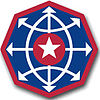

United States Army Provost Marshal General Active United States Army Corrections Command 

United States Army Provost Marshal General Active Military Police Commands & Brigades Unit SSI/DUI Subordinate to Component 46th Military Police Command 
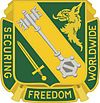
Michigan Army National Guard National Guard 200th Military Police Command - 11th Military Police Brigade
- 290th Military Police Brigade
- 300th Military Police Brigade
- 800th Military Police Brigade
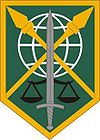
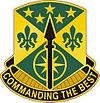
United States Army Reserve Reserve 8th Military Police Brigade 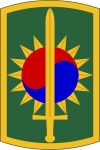
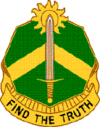
United States Army Pacific Regular Army 11th Military Police Brigade 
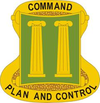
200th Military Police Command Reserve 14th Military Police Brigade - 701st Military Police Battalion

- A CO 701st Military Police Battalion
- B CO 701st Military Police Battalion
- C CO 701st Military Police Battalion
- D CO 701st Military Police Battalion
- E CO 701st Military Police Battalion
- 787th Military Police Battalion

- A Co. 787th Military Police Battalion
- B Co. 787th Military Police Battalion
- C Co. 787th Military Police Battalion
- D Co. 787th Military Police Battalion
- E Co. 787th Military Police Battalion
- F Co. 787th Military Police Battalion
- G Co. 787th Military Police Battalion
- 795th Military Police Battalion

- C Co 795th Military Police Battalion
- F Co 795th Military Police Battalion
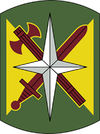

Military Police School / Fort Leonard Wood Regular Army 15th Military Police Brigade 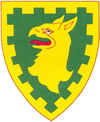
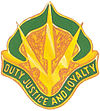
Fort Leavenworth, KS Regular Army 16th Military Police Brigade - 122 Prisoner of War Information Center (PWIC) Detachment
- 42nd Military Police Detachment
- 3rd Military Police Battalion (Prov.) Fort Stewart
- 91st Military Police Battalion – Fort Drum

- 23rd Military Police Company
- 511th Military Police Company
- 543rd Military Police Company
- 563rd Military Police Company
- 503rd Military Police Battalion (Airborne)

- 118th Military Police Company (Airborne)
- 21st Military Police Company (Airborne)
- 65th Military Police Company (Airborne)
- 108th Military Police Company (Air Assault)
- 519th Military Police Battalion – Fort Polk

- 716th Military Police Battalion – Fort Campbell

- 385th Military Police Battalion – Fort Stewart

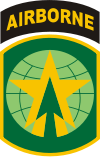
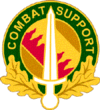
XVIII Airborne Corps / Fort Bragg Regular Army 18th Military Police Brigade - 95th Military Police Battalion – Mannheim

- 272nd Military Police Company – Mannheim
- 92nd Military Police Company – Baumholder
- 529th Military Police Company (Honor Guard)- Manheim
- 230th Military Police Company – Kaiserslautern
- 709th Military Police Battalion – Grafenwoehr

- 527th Military Police Company – Hohenfels – Ansbach
- 554th Military Police Company – Stuttgart
- 146th Military Police Platoon - Stuttgart
- 615th Military Police Company – Grafenwoehr – Vilseck
- 512th Military Police Platoon – Grafenwoehr
- 514th Military Police Platoon - Vilseck (Inactive)
- 630th Military Police Company – Bamberg – Schweinfurt
- 522nd Military Police Platoon, Schweinfurt
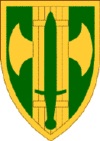
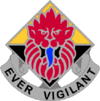
21st Theater Sustainment Command / USAREUR Regular Army 42nd Military Police Brigade - 504th Military Police Battalion – Fort Lewis

- 170th Military Police Company
- 54th Military Police Company
- 571st Military Police Company
- 66th Military Police Company
- 51st Military Police Detachment
- 508th Military Police Battalion

- 759th Military Police Battalion – Fort Carson

- 59th Military Police Company
- 110th Military Police Company
- 127th Military Police Company
- 984th Military Police Company
- 148th Military Police Detachment
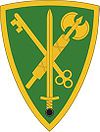
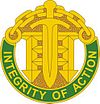
I Corps Regular Army 43rd Military Police Brigade 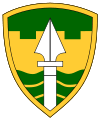

Rhode Island Army National Guard National Guard 49th Military Police Brigade 
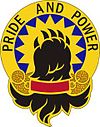
California Army National Guard National Guard 89th Military Police Brigade - 92nd Military Police Battalion (Ft Leonard Wood, MO)

- 13th Military Police Company
- 463rd Military Police Company
- 512th Military Police Company
- 988th Military Police Company
- 97th Military Police Battalion

- 116 Military Police Company
- 287 Military Police Company
- 300th Military Police Company
- 977 Military Police Company
- 720th Military Police Battalion-Fort Hood

- 64th Military Police Company
- 401st Military Police Company
- 410th Military Police Company
- 411th Military Police Company
- 93rd Military Police Battalion – Fort Bliss

- 978th Military Police Company
- 591st Military Police Company
- 212th Military Police Company
- 202nd Military Police Company
- 72nd Military Police Det
- 178th Military Police Det
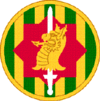

III Corps Regular Army 177th Military Police Brigade (Combat Support) 
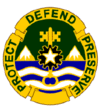
Michigan Army National Guard National Guard 220th Military Police Brigade 

Reserve 221st Military Police Brigade 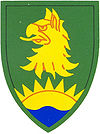
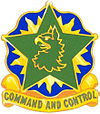
Inactive 258th Military Police Brigade Inactive 260th Military Police Brigade 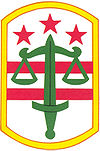
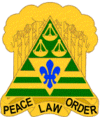
District of Columbia National Guard National Guard 290th Military Police Brigade 

200th Military Police Command Reserve 300th Military Police Brigade - 327th Military Police Battalion (Confinement)

- 384th Military Police Battalion (EPW/CI)

- 391st Military Police Battalion (I/R)

- 530th Military Police Battalion

- 783rd Military Police Battalion (I/R)

- 785th Military Police Battalion (I/R)

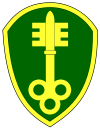
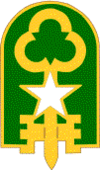
200th Military Police Command Reserve 800th Military Police Brigade (EPW) - 306th Military Police Battalion Uniondale, NY

- 310th Military Police Battalion Uniondale, NY

- 336th Military Police Battalion Pittsburgh, Pennsylvania

- 400th Military Police Battalion (I/R) Fort Meade, MD

- 88th Military Police Company (Combat Support), Fort Eustis, VA
- 305th Military Police Company (Guard), Wheeling, WV
- 352d Military Police Company (Guard), Rockville, MD
- 372nd Military Police Company (United States)|372nd Military Police Company (Combat Support)]] Cumberland, MD
- 443d Military Police Company (Guard) Sparks, MD
- 320th Military Police Battalion Ashley, Pennsylvania

- 744th Military Police Battalion

- 307th Military Police Company (Combat Support) New Kensington, PA
- 340th Military Police Company Jamaica, NY
- 343th Military Police Detachment Fort Dix, NJ
- 348th Military Police Detachment Fort Dix, NJ
- 423d Military Police Company Uniondale, NY
- 812th Military Police Company Orangeburg, NY
- 367th Military Police Company Willow Grove, PA

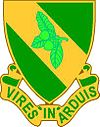
200th Military Police Command Reserve Military Police Command Panama Inactive Military Police Brigade Hawaii 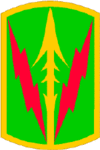

Inactive Military Police Battalions Unit SSI/DUI Subordinate to Component 793rd Military Police Battalion, Joint Base Elmendorf-Richardson - 164th Military Police Company, Joint Base Elmendorf-Richardson
- 545th Military Police Company, Joint Base Elmendorf-Richardson
- 472nd Military Police Company, Fort Wainwright
- 28th Military Police Detachment, Fort Wainwright
US Army Alaska Regular Army 91st Military Police Battalion, Fort Drum, NY 92nd Military Police Battalion, Fort Leonard Wood, Missouri 519th Military Police Battalion, Fort Polk, Louisiana 437th Military Police Battalion Columbus, OH - HHD 437th Military Police Battalion

- 324th Military Police Company (Middletown, OH)
- 838th Military Police Company (Youngstown, OH)
- 323rd Military Police Company (Toledo, OH)
- 583rd Military Police Detachment (L&O) (Youngstown, OH)
- 585th Military Police Company (Marysville, OH)
- 135th Military Police Company (Chagrin Falls, OH)
Ohio Army National Guard / 73rd Troop Command Columbus, OH National Guard Other military police
The U.S Navy uses the terms Shore Patrol and Master at Arms, while the U.S. Air Force uses the term Security Forces, or SPs (for their former name, the Security Police), to describe the Air Force Security Forces. The U.S. Coast Guard, whose members have civilian law enforcement authority under Title 14 of U.S. Code, uses Coast Guard Police Officers (regular and reserve military members assigned to uniformed patrol duties at Coast Guard Police Departments in various cities). The United States Marine Corps also employs military police forces. Although typically associated with and attached to a Marine Corps Base Provost Marshal, the USMC also fields combat support MP companies.[8] In addition, the US Marine Corps implemented the Marine Corps Civilian Police program in June 2007 to provide a civilian law enforcement service for garrsion policing and for Marine Corps facility protection.[9]
The Department of Defense use Department of Defense Police. Each service also maintains uniformed civilian police officers. They are referred to as either DOD Force Protection, DOD (Department of Defense) Police, DOD (Department of Defense) Guard, DA (Department of the Army) Police or DA Guard. The Air Force utilizes Department of the Air Force Police. The police officers' peacetime duties are the same as those of civilian police, namely to enforce the laws of the U.S. Military in the form of the Uniform Code of Military Justice (UCMJ), and the regulations of their particular installation. The civilian guards' duties are normally restricted to protection of priority resources. There is one Department of Defense police agency whose duties include executive protection and law enforcement throughout the Pentagon Reservation and throughout the National Capital Region (NCR). The United States Pentagon Police is the principal law enforcement arm of the U.S. Department of Defense and the federal police force of the Secretary of Defense. These officers/agents provide a wide array of services to the Department of Defense community throughout the NCR and possess full federal authority as described in Title 10 of United States Code (U.S.C.).
See also
- List of United States federal law enforcement agencies
- Military police
- Military law
- US Air Force Air Force Security Forces
- US Navy Master-at-arms
- US Navy Shore patrol
- US Coast Guard Maritime Law Enforcement Specialist
- United States Constabulary (Obsolete Organization)
- United States Pentagon Police
- Department of the Army Civilian Police
- Department of the Air Force Police
References
- ^ a b c Valuska, David L.; Reppert, Byron. "The Marechausee: von Heer’s Provost Corps. A Pennsylvania German Unit". http://www.vonheers.org/history.html. Retrieved 12 Nov 2011.
- ^ a b "Military Police Corps". GlobalSecurity.org. 2000. http://www.globalsecurity.org/military/agency/army/mp.htm. Retrieved 12 November 2011.
- ^ a b c "History of the United States Army Military Police School (USAMPS)". Fort Leonard Wood, Missouri: Military Police Regimental Association. p. 6. http://www.mpraonline.org/docs/USAMPS_History.pdf. Retrieved 16 November 2011.
- ^ Wright, Jr., Robert K. (1992). "Army Lineage Series: Military Police". United States Army Center of Military History. p. 9. http://www.history.army.mil/books/lineage/mp/mp.htm. Retrieved 12 Nov 2011.
- ^ Smith, C. Calvin (1991). "The Houston Riot of 1917, Revisited". Houston Review 13 (2): 91. http://studythepast.com/civilrightsundergraduate/materials/houstonriot1917_houstonreview.pdf. Retrieved 12 Nov 2011.
- ^ "MP: The Story of the Corps of Military Police". Stars and Stripes. http://www.lonesentry.com/gi_stories_booklets/militarypolice/index.html.
- ^ "History Archive:Linda Bray". Women in Military Service for America Memorial Foundation. http://www.womensmemorial.org/H&C/History/bray.html. Retrieved 12 November 2011.
- ^ "US Marine Corps MP". Wood.army.mil. http://www.marines.mil/unit/tecom/fortleonardwood/Pages/default.aspx. Retrieved 7 April 2011.
- ^ "Marine Corps Civilian Police". http://www.usmccle.com/. Retrieved 7 April 2011.
Further reading
- Robert K. Wright Jr., ed (1992). Military Police. Army Lineage Series. United States Army Center of Military History.
- MP: The Story of the Military Police in WWII
- US Army Lineage Series Military Police
- History of the Military Police School
- History of the Military Police Corps
- 545th MP Comp Cavalry MP
External links
Leadership Secretary of the Army · Under Secretary of the Army · Chief of Staff · Vice Chief of Staff · 4-star generals · Sergeant Major of the Army · House Armed Services Committee (House Subcommittee on Air and Land Forces) · Senate Committee on Armed Services (Senate Subcommittee on Air and Land Forces)

Components and
commandsArmy CommandsService ComponentsForces · Africa · Central · Europe · Pacific · North · South · Special Operations · Surface Deployment and Distribution · Space and Missile Defense
Direct Reporting UnitsNetwork Enterprise Technology · Medical · Intelligence and Security · Criminal Investigation · Corps of Engineers · Military District of Washington · Test and Evaluation Command · Military Academy · Reserve · Acquistion Support Center · Installation Management
Field ArmiesBranchesAcquistion Corps · Adjutant General's Corps · Air Defense Artillery Branch · Armor Branch · Aviation Branch · Army Band · Chaplain Corps · Chemical Corps · Civil Affairs Corps · Corps of Engineers · Dental Corps · Field Artillery Corps · Finance Corps · Infantry Branch · Inspector General's Corps · Judge Advocate General's Corps · Logistics Branch · Medical Corps · Medical Service Corps · Medical Specialist Corps · Military Intelligence Corps · Military Police Corps · Nurse Corps · Ordnance Corps · Psychological Operations Corps · Quartermaster Corps · Signal Corps · Special Forces · Transportation Corps · Veterinary Corps
Installations Training Uniforms and insignia Equipment History and traditions History · Continental Army · National Army · Army of the United States · United States Army Air Forces · Center of Military History · Institute of Heraldry · America's Army · Army Art Program · Army Band · Old Guard Fife and Drum Corps · Flag · National Museum · Rangers · Soldier's Creed · The Army Goes Rolling Along · Draft · Service numbersCategories:- Branches of the United States Army
- Military units and formations established in 1941
- Military police of the United States Army
Wikimedia Foundation. 2010.

